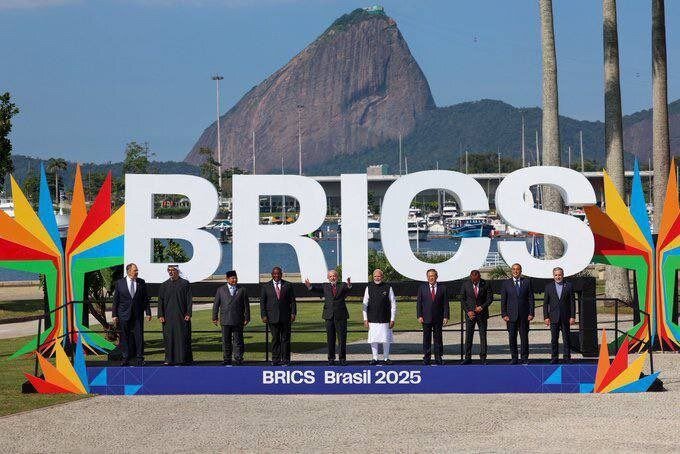BRICS backs Iran
Bloc's joint statement condemns US-Israeli attacks on Iranian soil

TEHRAN – In a display of Global South solidarity, the expanded BRICS bloc representing 11 nations and nearly half of humanity issued a resounding condemnation of the U.S.-Israeli military aggression against Iran during its 17th summit in Rio de Janeiro.
The declaration marked a watershed moment for Iranian diplomacy as Foreign Minister Abbas Araghchi leveraged Tehran’s membership to orchestrate a sweeping indictment of Western unilateralism while advancing a radical vision for peace in West Asia.
The bloc’s final statement, released Sunday night, left no room for ambiguity: “We condemn the military strikes against the Islamic Republic of Iran since June 13, 2025, which constitute a violation of international law and the Charter of the United Nations. We further express serious concern over deliberate attacks on civilian infrastructure and peaceful nuclear facilities under full safeguards of the IAEA, in violation of international law and relevant resolutions.”
The document emphasized that “nuclear safeguards, safety, and security must always be upheld” and demanded UN Security Council intervention—a direct challenge to Washington’s Security Council veto power.
Araghchi hailed the declaration as a strategic victory. In a Monday post on X, he said: “Iran is grateful for the strong and unequivocal condemnation by BRICS. Here at the BRICS summit, where states making up 40% of global GDP have gathered, the tectonic shifts our planet is witnessing have never been more apparent. Iran welcomes the dawn of a new era.”
Strategic diplomacy in Rio
The Brazilian-chaired meeting, held under the banner “Strengthening Global South Cooperation for More Inclusive and Sustainable Governance,” brought together Brazil, Russia, India, China, South Africa, Saudi Arabia, the United Arab Emirates, Egypt, Ethiopia, Indonesia, and Iran.
With the six new members admitted last year, the bloc now represents nearly half the world’s population and about a quarter of global GDP.
Leaders have described BRICS as a platform to amplify Southern voices, curb unilateral Western sanctions, and accelerate reform of the UN and Bretton Woods institutions.
Against this backdrop of growing momentum for systemic change and multilateral justice, Iran used the summit stage to mount a forceful legal and moral defense against the U.S.-Israeli 12-day war on Iran, particularly their illegal attacks against Iran’s civilian nuclear sites.
The Iranian top diplomat’s main summit address delivered a forensic dismantling of the legal pretext for the aggression: “No legal rule or logical principle justifies targeting peaceful nuclear facilities under IAEA supervision merely on speculation of future military use. Such attacks are absolutely prohibited under international law, including IAEA Resolution 533 and UN Security Council Resolution 487.”
Araghchi also detailed the resilience of the Iranian nation: “My people stood firm against this naked aggression. The attackers were forced to halt operations after heroic resistance by our armed forces. We will document Israel’s war crimes and crimes against humanity. The regime and its U.S. patrons must be held accountable for violating international humanitarian law.”
In another speech during a working lunch, Araghchi demolished the two-state framework: “When we speak of a Palestinian state, we mean nothing more than a municipality—an entity without defined borders, sovereignty, or authority. For 80 years, Iran has rejected this illusion.”
Invoking Iran’s 1948 UN vote against partition, he proposed a seismic alternative: “The just solution is a referendum with all original inhabitants—Jewish, Christian, and Muslim—establishing a single democratic state. This isn’t unrealistic. Did anyone propose separate states for Blacks and Whites when apartheid fell in South Africa? No. They built one democratic state where all coexist peacefully. This model must be repeated in Palestine.”
Araghchi’s diplomatic blitz at the Summit also included strategic talks with South African President Ramaphosa and Malaysian Prime Minister Ibrahim, advancing Iran’s Global South ties.
He met Brazil’s Foreign Minister as summit host, and held key sessions with Russian Foreign Minister Lavrov, Turkey’s Hakan Fidan, and India’s Jaishankar to coordinate regional strategy. A final exchange with Thai Minister Sindhuprai expanded Iran’s outreach across Asia.
A notable encounter was Araghchi’s meeting with Rabbi Yisroel Dovid Weiss, an anti-Zionist Jewish leader, who expressed solidarity with Tehran and condemned Tel Aviv’s policies. This meeting highlighted diverse international support for Iran’s position against Zionism.
A 'new global order' and the Trump factor
Araghchi’s policy speech described BRICS as the antidote to Western hegemony: “We gather not merely as nations, but as architects of a new global order—inclusive, just, and multipolar. Iran takes pride in joining this family, representing the Global South’s aspirations.”
His proposals included:
- A BRICS legal mechanism to combat unilateral sanctions
- Expansion of the New Development Bank’s infrastructure funding
- A joint AI research center to prevent “technological apartheid”
- Energy cooperation leveraging Iran’s strategic position
The summit unfolded under U.S. President Donald Trump’s threat: “Any country aligning with BRICS anti-American policies will face 10% tariffs.”
BRICS collectively condemned “unilateral tariffs inconsistent with WTO rules,” while the Kremlin dismissed claims the bloc targets third countries.
As the summit closed with plans for India to host in 2026, Araghchi’s closing words resonated: “BRICS, as the voice of the Global South, must defend international law and multilateralism. This is a historic moment for human civilization: When a civilized nation is targeted by a regime bound by neither law nor ethics.”
Leave a Comment